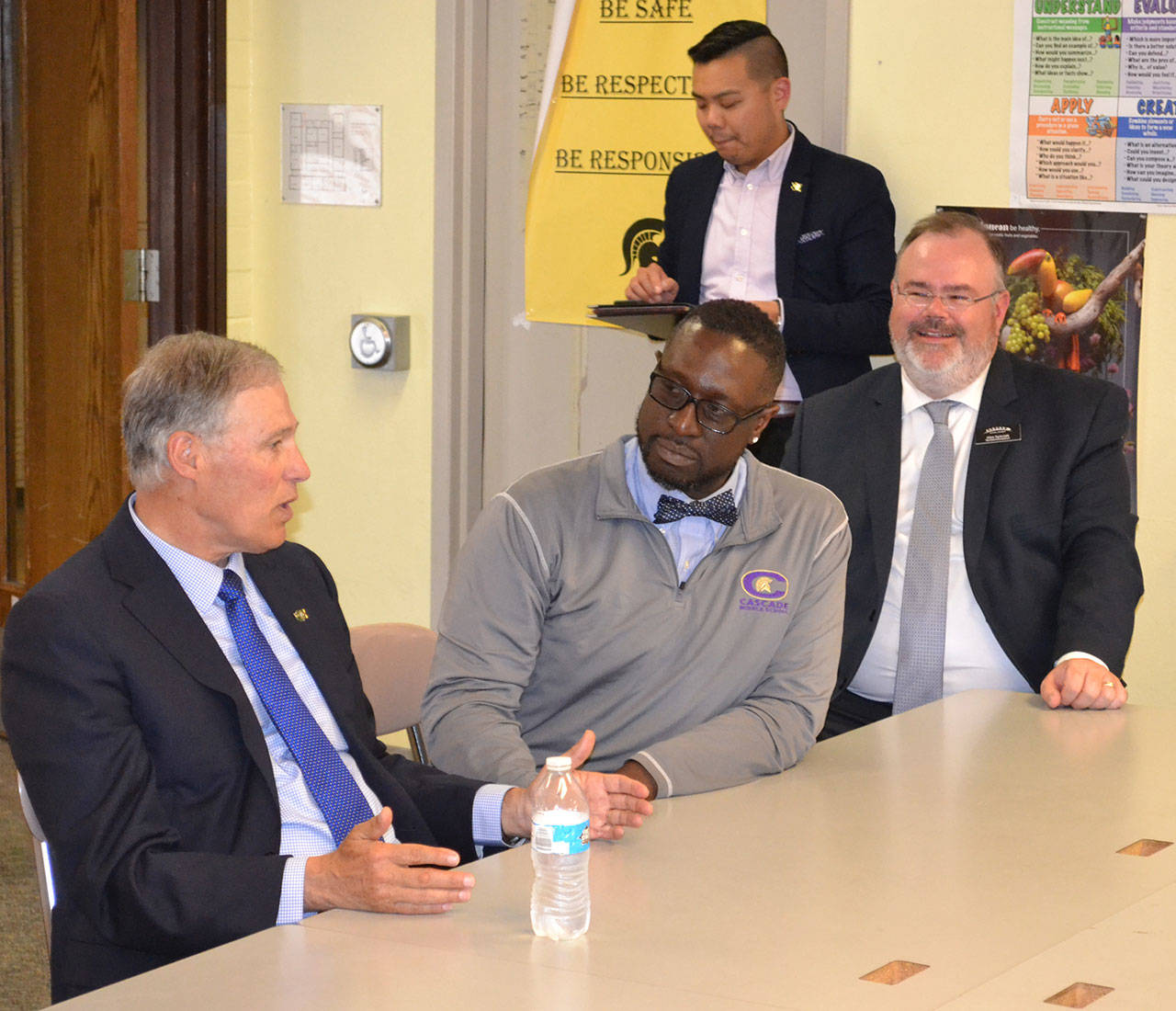Gov. Jay Inslee visited Cascade Middle School last week to see, he said, what’s working there.
Two hours later the governor left, bowled over by what he’d heard from students, teachers, administrators, principals and parents.
There to deliver Inslee’s first wow of the day, a classroom of 11 and 12 year olds taking part in the Auburn Valley YMCA’s after-school Community Learning Center (CLC) program, where Lanita Hill was teaching them how they think, how to assess their own strengths and limitations.
“That’s really advanced, I’m very impressed,” Inslee said.
This collaborative, grant-funded, year-round effort of the Y, the City of Auburn and the Auburn School District offers academic and enrichment opportunities to students at no cost to families, tooled to help students perk up their grades, improve attendance and develop life and social skills.
As Inslee learned, school staff identify students to participate in the program, where they get the help they need to learn and to adjust to the move from the elementary to the middle school environment.
No easy move.
Students get an outdoor activity time, followed by homework help in small groups. CLC staff helps students complete assigned homework in groups organized by grade level. They also participate in art, music, games, drama, dance, cooking, sports or other activities like swimming in a non-judgmental environment.
“I just feel so safe around here,” said one girl.
“…If I had had a program like this, I could have amounted to something,” Inslee said, drawing laughter. “… The concepts you are teaching these kids are just amazing.”
Later on, at a sitdown with teachers, support staff and Cascade Middle School Principal Isaiah Johnson, Inslee asked what he could do for them, in addition to long-term goals of providing additional support staff, smaller class sizes and additional access to technology, even as the state Legislature wrestles with the edict of the McCleary decision that the state meet its constitutional obligation to fully fund K-12 education.
“One of the things I hope to get accomplished is not just mere compliance with the judicial decision, but actually arming you with some innovative tools to help improve outcomes,” Inslee said. “ … I’m very hopeful that at the same time we provide the replacement for local levy dollars with state dollars, we also finance mentoring for teachers. My dad was a teacher, and he told me he learned to teach when he had a mentor help him.”
One helpful thing, Inslee heard, would be increased funding to do “creative things.”
“A couple years ago … kids walked into our honors class and said, ‘Do you have to be blond-haired and blue-eyed to get into the honors classes?” said Steve Homfelt, who teaches eighth-grade honors social studies at Cascade.
That question hit Homfelt and Alethea Dozier, who teaches eighth-grade honors language arts, between the eyes.
“We kind of looked at each other, like, oh my gosh,” Homfelt said.
“It was a realization of ‘wow, what’s going on, that’s not our kid,’ ” Dozier said.
So, at the behest of Johnson last spring, Homfelt and Dozier began to pour their energy into creating greater equity in the school’s honors program, that is, to get more kids from underrepresented groups into honors classes.
What worked, Dozier said, has been building relationships with those kids, finding time to sit down with them, work with them one-on-one.
“It’s been my experience,” Inslee responded, “that the schools that have been successful at improving graduation rates, at reducing the disparities in performance, have almost always had some kind of extra something – an additional relationship with a teacher, some additional time, some additional support.
“And they’ve always tried to find some way to finance it, frequently through grants. And that’s one of my big concerns – that grants evaporate. We can’t have confidence that federal grants will continue, and that’s one of the reasons I’m hopeful we’ll do better in general for school funding this year,” Inslee said.


